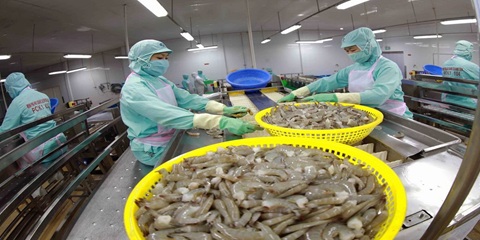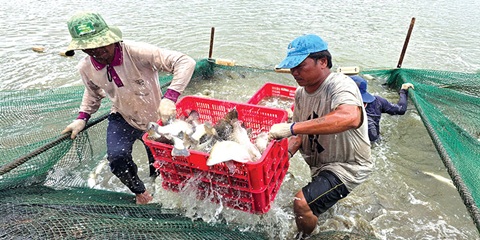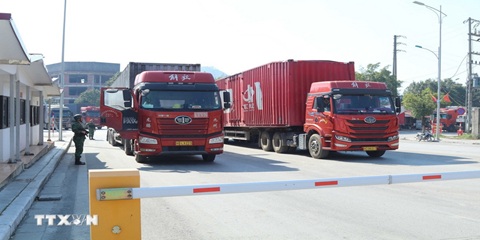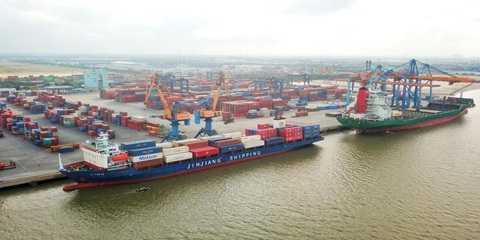Want to be in the loop?
subscribe to
our notification
Business News
TRADE STRENGTHENED AFTER 5 YEARS IN CPTPP
After five years, the Comprehensive and Progressive Agreement for Trans-Pacific Partnership (CPTPP) has expanded Vietnam's trade with key markets, particularly in the Americas, including Canada, Mexico, Chile and Peru. It has promoted multilateral trade, driven institutional reforms, attracted foreign investment and strengthened Vietnam's international integration.
Exports double
According to the General Department of Vietnam Customs, the country's trade with CPTPP markets in the Americas grew by 56.3%, from US$8.7 billion in 2018 to US$13.6 billion in 2023, despite challenges such as the global economic recession and the COVID-19 pandemic.
In particular, Vietnam's exports to CPTPP markets in the Americas nearly doubled (186%), from US$6.3 billion in 2018 to US$11.7 billion in 2023. This has contributed to a total trade turnover of US$137.7 billion with the Americas, including US$114.5 billion in exports.
Deputy Minister of Industry and Trade Nguyen Hoang Long said that Vietnam's participation in the CPTPP has driven institutional reforms and improved legal transparency, helping businesses operate more effectively and enhancing the country's international reputation to attract foreign investors. Relations between Vietnam and American countries have been strengthened through strategic commitments.
Vu Duc Giang, Chairman of the Vietnam Textile and Apparel Association (VITAS), mentioned that Canada and Mexico are demanding markets, but the CPTPP has enabled impressive growth for Vietnam's textile industry. He also pointed out three major challenges: evaluation standards, double standards, and payment methods. "Each brand has its own evaluation standards on sustainability and labor transparency, creating significant pressure for businesses," Giang shared.
Vietnam's seafood industry has also developed under the CPTPP, with member markets accounting for 25-27% of total seafood exports. However, in 2023, seafood exports decreased by 16.4% due to inflation, posing major challenges in maintaining growth momentum.
Highlighting Vietnam's trade ties with Canada, Mexico, and Peru during the CPTPP negotiations, Ngo Chung Khanh, Deputy Director of the Multilateral Trade Policy Department (Ministry of Industry and Trade), noted that trade between Vietnam and these three countries has grown quite well. Canada and Mexico saw relatively high and consistent growth, while growth with Peru remained modest.
In terms of bilateral trade improvements, according to Canadian Ambassador Shawn Steil, since the CPTPP's implementation, trade ties between Canada and Vietnam have grown well, with Vietnamese exporters benefiting from reduced tariffs. Vietnam now accounts for 35% of Canada’s imports, making Canada one of the top 10 potential markets for Vietnamese products thanks to the CPTPP.
Canada has successfully expanded trade with other CPTPP members, both in Asia and the Americas. The trade pact has enabled Canadian businesses to tap into new markets, enjoy lower tariffs, gain better market access and benefit from stronger intellectual property protection. Canadian products in Vietnam have become more competitive compared to other markets.
Mexican Ambassador Alejandro Negrin Munoz highlighted the impressive trade growth between the two countries since the CPTPP's implementation. Vietnam is Mexico's 10th largest trading partner, with Vietnam's exports to Mexico increasing tenfold over the past five years. Mexico is Vietnam's largest customer in Latin America. 97% of bilateral trade is from Vietnam's exports to Mexico, while only 3% of Mexico's goods are exported to Vietnam. This suggests there is still plenty of room for bilateral trade between the two countries.
Peruvian Ambassador Patricia Raez Portocarrero, noted that bilateral trade in 2023 reached only US$700 million, and in the first seven months of 2024, it reached US$434 million, a 5% increase year-over-year. Despite significant growth, there is still ample room for further trade growth between the two countries.
Potential for further growth
Despite positive results from the CPTPP, Deputy Minister Nguyen Hoang Long mentioned significant untapped potential: Vietnam's export value added is low, branding needs more focus, and the share of Vietnamese goods in American imports remains limited.
Meanwhile, the Americas is a vast market, closely interconnected through overlapping free trade blocs such as the North American Free Trade Agreement (CUSMA), the Pacific Alliance (PA), and the Southern Common Market (MERCOSUR). By taking advantage of CPTPP benefits and the favorable gateway positions of member countries like Canada, Mexico, Chile and Peru, businesses can consider expanding and diversifying their import-export markets to this dynamic and promising region.
To capitalize on these opportunities, Deputy Minister Nguyen Hoang Long urged businesses to gather market information, seek efficient logistics solutions, and better utilize CPTPP tariff preferences. He suggested increasing the use of preferential origin certification (C/O) by establishing domestic raw material centers and leveraging "cross-origin" and "cumulative origin" rules. Businesses should also strengthen connections to engage more deeply in the global supply chain, especially with CPTPP member countries.
State management agencies also need to coordinate closely with businesses. The Vietnamese government is committed to continuing to reform administrative procedures, applying technology in import-export management, and supporting businesses in connecting with international partners.
According to Canadian Ambassador Shawn Steil, businesses need to further raise awareness of the agreement to ensure that all importers and exporters can take full advantage of the CPTPP benefits. Together, they should find creative solutions to promote partnerships, and expand into new markets across the Americas and Asia.
To balance the trade relationship between Vietnam and Mexico, Alejandro Negrin Munoz suggested that Mexico needs to have a business handbook for Mexican enterprises entering the Vietnamese market. The Vietnamese government should support Mexican businesses in accessing agricultural markets, obtaining quarantine certification, and ensuring greater transparency in local regulations in line with CPTPP standards. "The CPTPP balance is positive, so we need to continue working together to fully exploit the potential of these agreements," emphasized Mexican Ambassador Alejandro Negrin Munoz.
Source: VCCI
Related News

VIETNAM’S SEAFOOD EXPORTS HIT OVER US$10 BILLION IN JAN-NOV
Seafood export revenue in November alone amounted to nearly US$990 million, up 6.6% year-on-year. Key product groups posted solid gains. Shrimp exports rose 11.7% to over US$385 million, supported by strong demand for whiteleg shrimp and lobster. Tra fish shipments increased 9.7% to almost US$197 million, while marine fish, squid, and mollusk exports maintained their recovery.

VIETNAM’S AGRO-FORESTRY-FISHERY EXPORTS HIT NEW RECORD IN JAN-NOV
Vietnam’s agro-forestry-fishery export revenue reached an estimated US$64.01 billion in the first 11 months of 2025, up 12.6% year-on-year and surpassing the full-year record of US$62.4 billion set in 2024. Agricultural exports reached US$34.24 billion, up 15% year-on-year, while livestock products brought in US$567.4 million, a 16.8% increase. Seafood exports rose 13.2% to US$10.38 billion, and forestry products earned US$16.61 billion, up 5.9%.

HANOI REPORTS RECORD-HIGH BUDGET REVENUE IN 2025
Hanoi’s budget revenue is estimated to reach VND641.7 trillion in 2025, the highest level ever recorded and nearly 25% above the revised target, according to a report by the municipal government. Data from the city’s socioeconomic performance review shows that total state budget collections in 2025 are projected to reach 124.9% of the adjusted plan and rise 24.9% from 2024, the Vietnam News Agency reported.

VIETNAM, CHINA TO PILOT TWO-WAY CARGO TRANSPORT AT LANG SON BORDER
Vietnam and China will launch a one-year pilot program on December 10 to allow two-way cargo transport through the Huu Nghi–Youyi Guan international border gates in Lang Son Province, reported the Vietnam News Agency. The Dong Dang-Lang Son Economic Zone Management Board said the trial aims to reduce transport costs and improve customs clearance capacity.

VIETNAM’S IMPORT-EXPORT VALUE NEARS US$840 BILLION IN JAN-NOV
The total value of Vietnam’s imports and exports was nearly US$840 billion between January and November this year, the highest level ever recorded, according to the National Statistics Office. In its latest report on the country’s socio-economic performance, the National Statistics Office highlighted a series of positive economic indicators, with trade emerging as one of the strongest drivers of growth.

OVER 19 MILLION INTERNATIONAL VISITORS COME TO VIETNAM IN JAN-NOV
Vietnam received more than 19.1 million international visitors in the first 11 months of 2025, a 20.9% increase year-on-year and the highest level ever recorded, according to the National Statistics Office. The figure surpasses the full-year record of 18 million arrivals set in 2019, before the Covid-19 pandemic. Nearly two million foreign visitors arrived in November alone, up 14.2% from October and 15.6% from the same period last year.
























